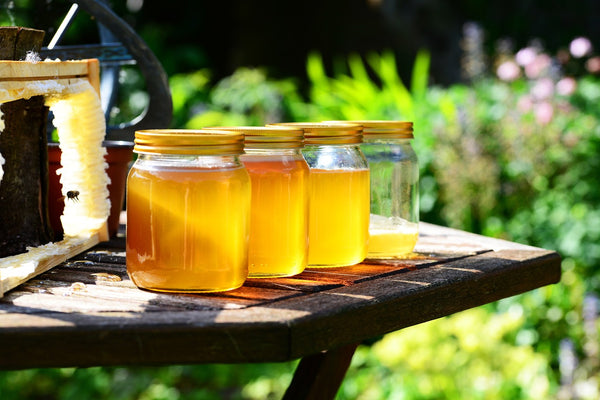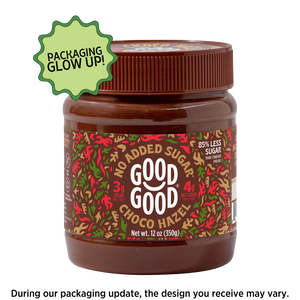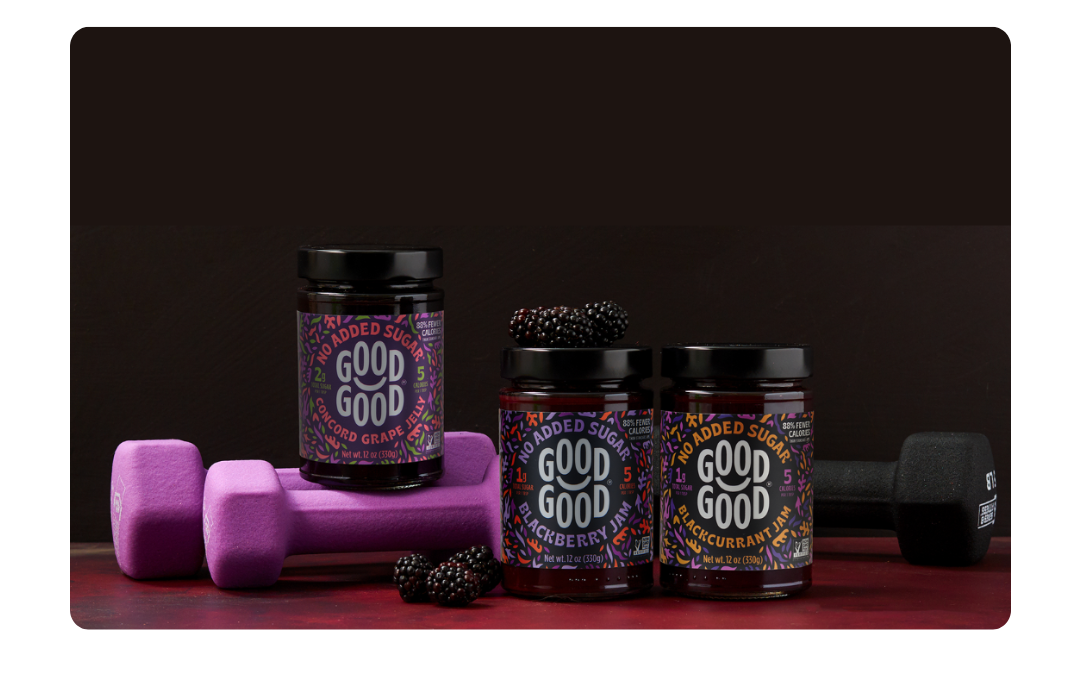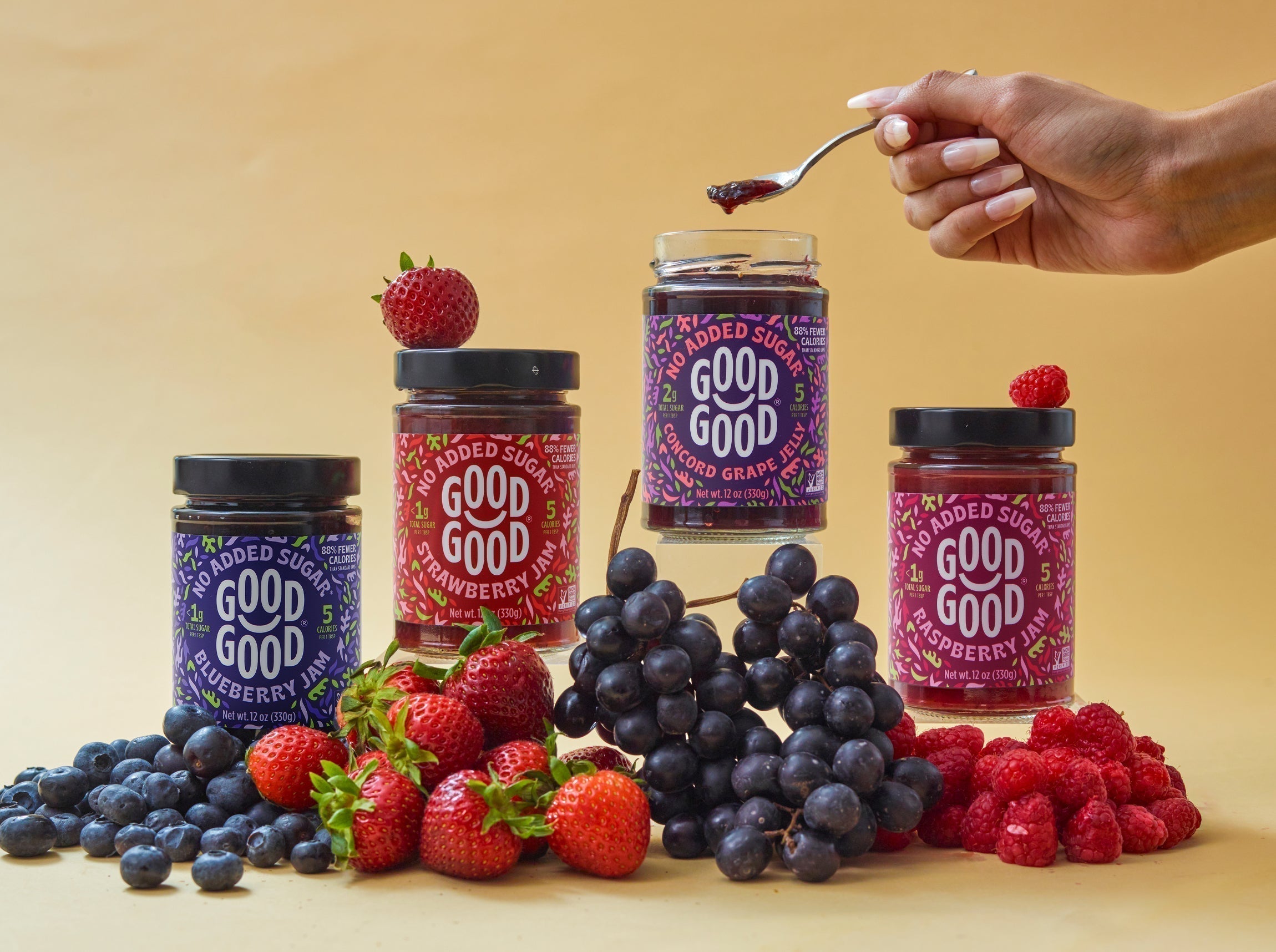In this bustling world, finding the right balance in your diet, especially in your cup of tea, can be a challenge.
Enter healthy sugar alternatives for tea – the best way to enjoy your favorite blend. These replacements help you reduce your sugar intake while still savoring the joy of sweetened tea.
At GOOD GOOD, we specialize in crafting products made with no added sugar, which is perfect for those seeking nutritional solutions for spicing up their tea collections.
Dive into our guide as we explore the best sugar substitutes and unveil the secret to adding the ultimate touch of sweetness to your tea, all while keeping your health in check.
What this article covers:
9 Sugar Alternatives for Tea
At GOOD GOOD, we're here to guide you through some natural white sugar alternatives that can enhance your tea without the added health risks.
Table: Healthy Sweeteners for Tea
|
Sweetener |
Nutritional Profile |
Health Benefits |
Best With Teas |
|
Stevia |
|
|
|
|
Erythritol |
|
|
|
|
Maple Syrup |
|
|
|
|
Coconut Sugar |
|
|
|
|
Honey |
|
|
|
|
Xylitol |
|
|
|
|
Liqorice Root |
|
|
|
|
Agave Nectar |
|
|
|
|
Molasses |
|
|
|
Stevia
Stevia, a natural sweetener derived from the Stevia rebaudiana plant of South America, offers a calorie-free way to sweeten your tea. It's significantly sweeter than refined sugar, meaning that a little goes a long way.
Stevia has been shown to help prevent weight gain and reduce blood sugar levels, making it an excellent choice for those looking to maintain a healthy lifestyle.
Because GOOD GOOD Jams are sweetened with Stevia, they bring the same natural sweetness with a burst of real fruit flavor. It’s like an instant flavored tea, but without the added sugar.
Erythritol
Erythritol is a sugar alcohol naturally derived from fruits that provides a sweet taste and doesn't contribute to tooth decay.
It's lower in calories compared to traditional sugar and also offers zero impact on insulin levels, making it suitable for people with diabetes.
It's generally safe and offers a sugar-like aesthetic, which is evident in products like our GOOD GOOD Strawberry Jam. Our team discovered through using this product that it's also keto-friendly and protects your gums.
Maple Syrup
Maple syrup, a natural and nutrient-rich sweetener, can add a unique flavor to your tea. Derived from the sap of maple trees, it contains antioxidants and minerals like zinc and manganese.
We recommend opting for the pure, organic variety to avoid harmful chemicals and excess calories while giving yourself the best sugar substitute that tastes like sugar.
Coconut Sugar
Coconut sugar, made from the sap of the coconut palm, offers a lower glycemic index than regular sugar, making it one of the best granulated sugar substitutes for maintaining stable blood sugar levels.
Our findings show that it also retains some nutrients found in the coconut palm, including iron, zinc, calcium, and potassium.
Its caramel-like taste can add a delightful flavor to your tea.
Honey
Honey, a natural sweetener rich in antioxidants and derived from the pollination of flowers by bees, offers a nutritious replacement to sugar for sweetening tea. Our research indicates that it also provides relief for colds and coughs.
While honey is sweeter than processed sugar, allowing for less use, it's essential to consume it in moderation due to its high calorie content.
Xylitol
Like erythritol, xylitol too is a sugar alcohol, and another excellent choice for sweetening tea. It's similar to refined sugar but with fewer calories and a lower glycemic index, making it a suitable option for diabetics.
Xylitol also offers numerous dental benefits, such as reducing the risk of enamel damage. Although xylitol is healthier than traditional sugar, it's advisable to use it sparingly as excessive consumption can potentially lead to digestive issues.

Licorice Root
Licorice root, with its naturally sweet flavor, is a unique addition to tea.
Why is natural sugar better than artificial sugar, particularly when discussing licorice root?
Unlike artificial sugars, licorice root has a positive impact on your wellbeing by:
- Aiding in bronchitis recovery
- Aiding eczema relief
- Aiding heartburn relief
Using licorice root in tea can add a sweet, complex taste without the need for added sugar or artificial sweeteners.
Agave Nectar
Agave nectar is a sweetener derived from the agave plant, offering a lower glycemic index than sugar. It's high in fructose and sweeter than honey and processed sugar combined, requiring less quantity to achieve the desired flavor.
Based on our observations, adding agave nectar to tea can provide a smooth, mild sweetness if you're looking to reduce your sugar intake.
Molasses
Molasses, a by-product of sugar cane processing, stands out as a nutrient-rich sweetener. It's composed of vitamins and minerals such as iron, calcium, and magnesium.
Molasses imparts a rich, robust flavor to tea, making it an ideal choice if you're seeking depth in your beverage's taste profile. It's also an excellent low sugar substitute for honey.
Like other sweeteners, moderation is key, ensuring you reap the health benefits without overindulging.
At GOOD GOOD, we understand the importance of finding the perfect balance between wellness and taste.
Our products align with this philosophy, offering delightful ways to enjoy your favorite tea without the guilt.

Natural Sweeteners For Tea FAQ
How Do You Add Sweeteners to Hot Tea?
Begin by brewing your tea as usual.
While the tea is still hot, add your preferred natural sweetener such as stevia, honey, or maple syrup. Through our practical knowledge, the heat from the tea will help dissolve the sweetener quickly and evenly.
Start with a small amount and taste as you go, since a natural sweetener like our GOOD GOOD Jams or Jelly products that can be more potent in flavor than refined sugar.
Stir well to ensure that it's fully integrated into the tea - then enjoy!
How Do I Add Sweeteners To Iced Tea?
When sweetening iced tea, it's best to incorporate the sweetener while the tea is still warm for better dissolution.
Sweeteners like honey or agave nectar are excellent choices for iced tea due to their liquid form which blends well with this beverage.

Is Sweet Tea and Iced Tea the Same?
Sweet tea and iced tea aren't the same. Iced tea is simply tea that has been cooled down and served over ice. It can be sweetened or unsweetened according to your preference.
Sweet tea, on the other hand, is a type of iced tea that's traditionally sweetened with a large amount of sugar while the tea is still hot, giving it a distinctive flavor.
Why Should You Lower Your Added Sugar Intake?
Lowering your added sugar intake is crucial for maintaining good health.
Our investigation demonstrated that high consumption of added sugars has been linked to various ailments, including:
- obesity
- type 2 diabetes
- heart disease
- tooth decay
By substituting traditional sugars with natural sweeteners, you can enjoy the sweet taste without the negative impacts on your body.
Moreover, natural sweeteners often possess additional nutrients and have a lower glycemic index, which can help regulate your blood sugar levels.
Whether enjoying a hot cup of tea or a refreshing iced beverage, our GOOD GOOD can provide a delicious and nutritious alternative to traditional sugar.

Conclusion
In this sweet journey, we've looked at healthy sugar alternatives for tea and the best ways to add them to your favorite blends.
Remember, making small changes like switching to natural sweeteners with no sugar added can have big impacts on your wellness. So why not take the first step towards a robust lifestyle?
Try GOOD GOOD's healthier sugar substitutes now and taste the difference in your cup. Let's brew a better, healthier future together!





![[title] Reforestation Donation by Dollar Donation Club sold by US GOOD GOOD®](http://goodgoodbrand.com/cdn/shop/files/DollarDonationClubShopify_1_300x.jpg?v=1712681952)







